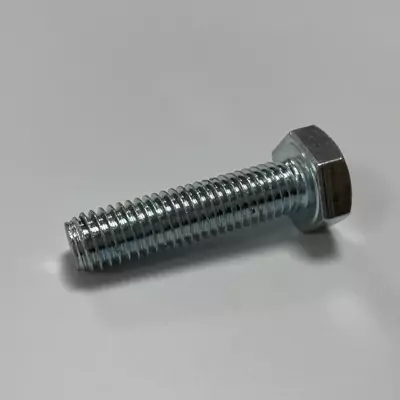caTEGORIES
Tags
Wood vs. Machine Screws: What Sets Their Manufacturing Processes Worlds Apart?

Posted: May 08, 2025
Categories: News
Tags: news
Wood screws and machine screws are produced with very different techniques. Wood screws often have a sharp point and coarse threads to bite into the wood, while machine screws have a consistent diameter and fine threads to mate with nuts or tapped holes.
Threading Techniques for Wood and Machine Screws
Thread Design for Wood Screws
The shank of a wood screw has threads that taper down the length of it, which allows the screw to easily drive into the wood without splitting it. It provides ultimate holding power by gripping as much of the screw as it can with coarse threading and in softer materials. The design of the thread itself is important because it gives a delicate balance between penetration and material displacement to prevent cracking or damage.
Precision Threading in Machine Screws
In contrast, machine screws are designed for precision and have consistent threading up and down the entire fastener length. This allows for pre-tapped holes or nuts, resulting in a secure fastening in the metal or other hard materials. The threads are close together and thin, maximizing the holding power of the screw to resist torque and remain tight during stress.
Heat Treatment Processes in Screw Production
Heat Treatment Requirements for Wood Screws
Many wood screws are heat treated in the most basic of ways to give them added strength and bendability. They’re treated to endure the rigors of ramming them into wood without shattering or deforming. This is often done using hardening and tempering, to obtain the necessary mix of toughness and ductility.
Advanced Heat Treatment Methods for Machine Screws
The heat treatment process for screws is complex since screws are used in high-stress areas that require processes like hardening and tempering than the other fasteners. Techniques such as carburizing, nitriding, or induction hardening are used to obtain a hard surface for wear resistance with a tough core. These techniques help to improve wear resistance, which enhances longevity under extreme conditions for machine screws.
Surface Coating and Finishing Differences
Protective Coatings for Wood Screws
Wood screws may be plated with finishes that protect against the environment including moisture and corrosion — for example, zinc plated or galvanized. Not only that, these coatings help in improving aesthetics since they provide a clean finish, as a result, helping increase longevity.
Specialized Finishes for Machine Screws
The finishes on a machine screw are specifically designed for the environment where they will be used. Typical finishes are bright zinc plating (BZP), hot-dip galvanizing (HDG) or mechanical galvanizing, which are all better than galvanic corrosion resistance-wise. Hexagon headset screws DIN933 can be supplied with finishes like zinc flake coating or self-color, to mention some examples.
If you are looking for high-quality fasteners to meet different needs, then QEWIT is a company that provides the best category of products like wood screws, machine screws, etc., that can give the best in quality as well as withstand some serious industrial standards.
Customization and Tolerance Levels in Screw Production
Tailored Specifications for Wood Screw Applications
Wood screws are designed for the specific requirements of woodworking applications. Choosing the type of material, such as carbon steel or stainless steel, is the first step in the customization process to guarantee durability and protection against environmental conditions.
Screws manufacturers normally give extras like protective coatings. Wood screws often have zinc plating or galvanization to provide corrosion resistance and longer life. Combined with a shiny look that is suitable for visible applications, these finishes enhance the performance. These coatings enhance the performance as well as provide a neat and clean look which makes them suitable for visible applications as well.
High-Precision Tolerances in Machine Screw Manufacturing
For the same reason, machine screws used in high-precision applications cannot be handled with the same approach as the other screw types. These types of screws are designed with millions of threads along the entire shaft, so they will always fit the hole or nut that is already been tapped.
This precise threading is the backbone of holding tightness under stress—important in industrial machinery or electronic assemblies. The exactness of the threading is crucial for tightness when pressure is applied — as in industrial machinery or electronic assemblies.
It is manufactured with high tolerances using some advanced techniques. Take DIN 7985 Pan Head Recessed Machine Screws, for example, these are designed as per stringent standards which imply you get a replicated with every offered sample. The surface finishes on them like bright zinc plating (BZP) improve corrosive resistance but lead to inaccuracy of the screw.
QEWIT’s Product Range and Recommendations
QEWIT’s Solutions for High-Quality Wood Screws
QEWIT provides a comprehensive range of wood screws for multiple applications. Including stock options and custom-made from carbon steel or stainless steel. All screws passed through strict quality control to check durability and functionality. Every screw has gone through stringent quality checks for durability and performance.
These screws are protected with coatings like zinc plating to protect them from moisture and corrosion, making them indoor and outdoor-ready. Apart from that, QEWIT also manufactures custom screws. So if you need screws that a not standers, you can use this service of QEWIT to get screws that suit exactly the specifications of your project.
All their products come with international certificates to maintain the commitment to quality, not just during production but throughout the entire process.
Why Choose QEWIT’s Machine Screws?
Precision and reliability matters most when it comes to machine screws. QEWIT manufactures the high-quality component which meets the international standard. These screws are fine-threaded to be locked tightly in pre-tapped nuts.
These mechanical properties are improved by advanced heat treatment methods, preventing deformation of extremely high torque and stress.
To accommodate different environmental conditions, QEWIT has screws in a wide range of materials, including carbon steel and stainless steel. The capability to provide tailored solutions also helps to distinguish the company as a reliable partner in precision fastening.
FAQs
1. What makes wood screws suitable for woodworking?
Wood screws feature tapered threads and pointed tips that allow easy penetration into the wood while preventing splitting. Their coarse threading provides a strong grip on softer materials like wood.
2. How do machine screws differ from other types?
Machine screws have uniform threading along their entire length, designed for compatibility with pre-tapped holes or nuts. They prioritize precision and durability for use in industrial settings.
3. What customization can you get with QEWIT?
A: Along with non-standard sizes, plating like zinc plating, and special heat treatment as required by clients are also provided on a case-by-case basis at QEWIT. QEWIT is a very customizable solution.


